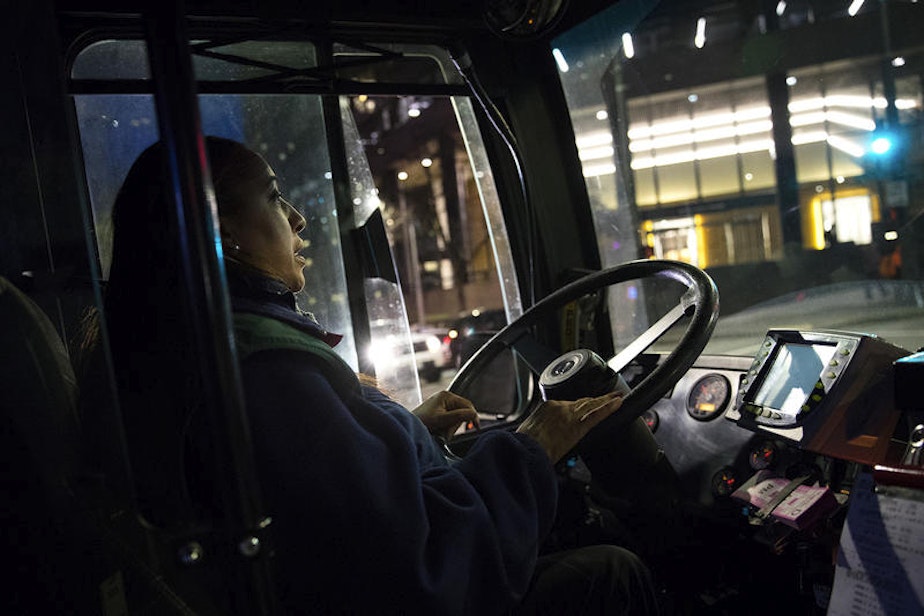What it’s like to commute every day on Seattle’s most crowded bus

The most congested bus route in King County runs down Aurora. It’s called the RapidRide E Line. The crowding on those buses brings all kinds of people together.
Rider Vera Mapes: “One time I saw a homeless man in a wheelchair get kicked off the bus by four cops. And then he pissed on the bus stop when he got off.”
Rider Ezgi Coban: “I saw people smoke crack before on the bus.”
Rider Carlos Marquez: “I saw someone pull out a TASER.”
Rider Elissa Gibson: “I’m okay, I have my pepper spray.”
During rush hour, an E Line bus heads south from Shoreline every five minutes. Driver Nichole Fabre is at the wheel.
Fabre: “I drive the bus up and down Aurora. That’s what I do.”
The route is a straight shot down Highway 99 past parking lots and seedy motels and Green Lake with its joggers. It continues past Amazon in South Lake Union and ends in the stadium district, near a cluster of homeless shelters.
Rider Casey Stevens gets on at Green Lake. She says the bus picks up all kinds of people.
Stevens: “Oh, man, it runs the gamut. You find a lot of people commuting to Amazon, like myself. You find a lot of homeless folks trying to get from whatever shelter they were staying at to wherever they’re going to be during the day, and everything in between.”
When the bus pulls onto the Aurora Bridge, people are squeezed together like sardines.
Fabre: “I do tell the passengers if you can’t fit behind the yellow line, you have to get the next bus. Of course, they try to do it, but I say, ‘No, we’re not going to pack like that. It’s not gonna work.’” Driver Nichole Fabre checks the belts on the back of her bus before leaving the King Country Metro Atlantic Base around 3:50 a.m., on Wednesday in Seattle.
Nichole Fabre drives an E Line bus at 6:08 a.m., on Wednesday on Highway 99 in Seattle. The E Line, which comes every five minutes, is Seattle's most congested bus line, and perhaps also its most storied.
Rider Curtis Haramoto is a junk hauler. He boards the E Line in Shoreline.
Haramoto: “There’s not really anything bad about it except for the occasional crazies. ... Some lady punched out another lady that she had a major problem with.”
Indeed, this is a bus line for observing a range of humanity. Rider Elissa Gibson has a favorite person she likes to watch: “He’s like the dancing guy. He dances and sings.”
KUOW: “The whole ride?”
Gibson: “The whole ride! I got him on video twice.”
You can smile about a guy who dances and sings, but some behaviors on the bus indicate untreated mental illness or other forms of distress. Kaniz Abidi, a student at Seattle Pacific University, rides the E Line bus on Aurora Avenue North at 7:40 a.m., on Wednesday in Seattle. The E Line has a high level of incidents reported, owing to its popularity and the neighborhoods it passes through.
Paridon Williams rides the E Line bus at 4:07 a.m., on Wednesday in Seattle. The E Line is the city's most popular bus line.
Safety incidents happen on buses across the region. But the E Line has the second highest number of incidents. Still, it’s Metro’s most popular route, and it’s also one of the fastest growing.
Rider Jeffrey Webb is homeless and on the E Line for warmth. He calls it a refuge, similar to a warming center.
“I’ve walked by a building and just wondered if it was warmer in there than out on the street and wanted to break the windows,” he said, so he could climb inside and get warm. Commuters ride the E Line bus southbound on Aurora Avenue North, around 5:30 a.m., on Wednesday in Seattle.
Commuters ride the E Line bus southbound on Aurora Avenue North around 5:30 a.m., on Wednesday in Seattle.
Instead, he boards the E Line. When he can’t pay the fare, he doesn’t. Sometimes fare enforcers catch people who slip in without paying.
Rider Ezgi Coban watches it happen from her seat in the back.
Coban: “It seems like the people who get the most punished are the poor people who can’t afford to pay the fare. And that’s kind of upsetting to me.”
As for the driver, she doesn’t judge her passengers.
Fabre: “They don’t bother me none, at all, as long as everybody’s good to each other on the bus, that’s all that matters to me. As long as we can get from point A to point B, without any issues, that’s all that matters to me.”

